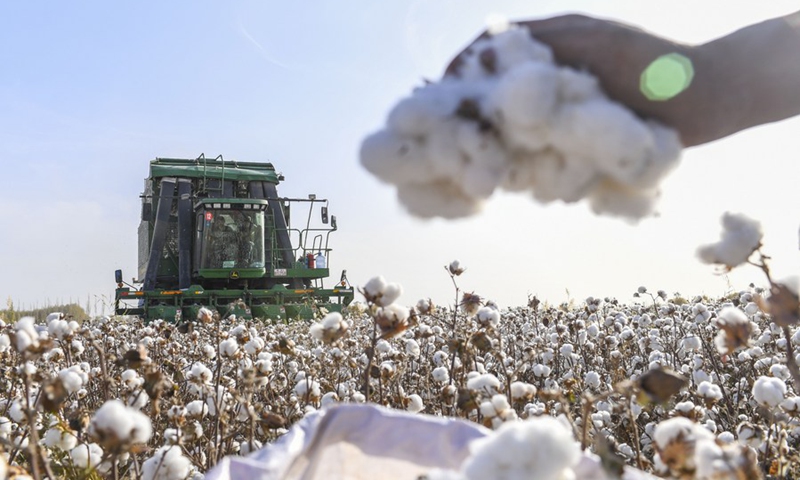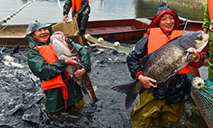No forced labor in Xinjiang but Western exploitation: report

A cotton picking machine moves in a cotton field in Dolatbag Town of Bachu County, northwest China's Xinjiang Uygur Autonomous Region. (File photo: Xinhua)
Three days after the US signed the Uygur Forced Labor Prevention Act into law, which maliciously denigrates the human rights situation in China's Xinjiang, Chinese scholars countered it with detailed field researches and contrary conclusions.
On Sunday, a group of scholars from Jinan University in Guangzhou, South China's Guangdong Province published a paper on the real situation of cotton production in Northwest China's Xinjiang Uygur Autonomous Region and the impacts of the US' Xinjiang-related sanctions on the global cotton industry chain.
The US' cotton-related sanctions in Xinjiang are false justice, and Chinese cotton textile and garment companies are actually being forced to work and exploited by the Western capitalist globalization system, said the report.
The research team spent more than three months in Xinjiang's Aksu and Kashi, and 17 counties and cities in Guangdong, doing research and interviewing more than 70 people, including cotton farmers, companies and heads of cotton textile and garment enterprises.
During the process, researchers found that cotton field operations in Xinjiang are highly mechanized, employment is standardized, and there are no signs of forced labor. Sowing, management, picking and other aspects are gradually achieving full mechanization.
The local community has spontaneously formed a labor ecosystem in which large planters employ local villagers as helpers, and both parties sign labor contracts, said Li Hua, first author of the report. "The rights and interests of both parties are protected during the employment period."
The US' sanctions on Xinjiang did not have a significant impact on China's cotton manufacturing chain, Li said.
According to farmers in Xinjiang, under the protection of the government, enterprises and agricultural cooperatives, Xinjiang cotton growers are not worried about the risk of US sanctions, and still hope to continue to expand production. Thanks to the strong resilience of China's market, the domestic cotton processing and manufacturing links work well.
Li pointed out that China's cotton industry is the central link in the global cotton industry chain. Therefore, an attempt to destroy the Chinese cotton industry is equivalent to doing that to the global cotton industry chain.
"A large number of facts prove that the US' sanctions caused a blow to the global cotton industry chain, and increased the transaction costs of each link on the chain. Such cost increases are ultimately borne by US importers and consumers," said Li.
In the US-led capitalist global economic system, Chinese cotton enterprises are actually at the bottom of the value chain and are "forced and exploited to labor" by the Western capitalist globalization system, according to the research.
The US' cotton-related sanctions are "false justice," which in the name of maintaining the trade order destroyed the global industry chain, it said.
"The results of this investigation, which was published three days after the US signed the Xinjiang-related act, can be seen as a rebuke to the unjustified accusations of the US," Li told the Global Times. "We actually visited the cotton fields in Xinjiang and saw the real situation, which is opposite to the US' claims."
On Thursday, the US signed the Uygur Forced Labor Prevention Act into law, maliciously denigrating the human rights situation in Xinjiang in disregard of facts and truth. It seriously violated international law and basic norms governing international relations and grossly interfered in China's internal affairs, to which China has expressed firm rejection.
"The US' smear campaign against emerging industries in other countries is a common tactic," said Cao Wei, a researcher at Institute for Central Asian Studies at Lanzhou University in Northwest China's Gansu Province. "It intends to suppress trade in one country, but in fact destroys the global market."
Li said that the research group will now focus its research on the oral history of the victims and those who lived through the terrorist violence in Xinjiang.
Photos
Related Stories
- Commentary: U.S. conspiracy on Xinjiang an exercise in futility
- U.S. Xinjiang-related sanctions undermine global cotton industry chain: report
- U.S. Xinjiang-related act economic bullying, against int'l law, analysts say
- China Enterprise Confederation opposes U.S. trade hegemony over Xinjiang products
- Chinese textile associations oppose U.S. ban on Xinjiang products
Copyright © 2021 People's Daily Online. All Rights Reserved.










